79 years ago today, the inspirational United Nations Charter was signed by 50 countries in San Francisco, a document that began with the following: “We the peoples of the United Nations, determined to save succeeding generations from the scourge of war, which twice in our lifetime has brought untold sorrow to mankind, and to reaffirm faith in fundamental human rights, in the dignity and worth of the human person, in the equal rights of men and women and of nations large and small…” READ the preamble in its whole… (1945)
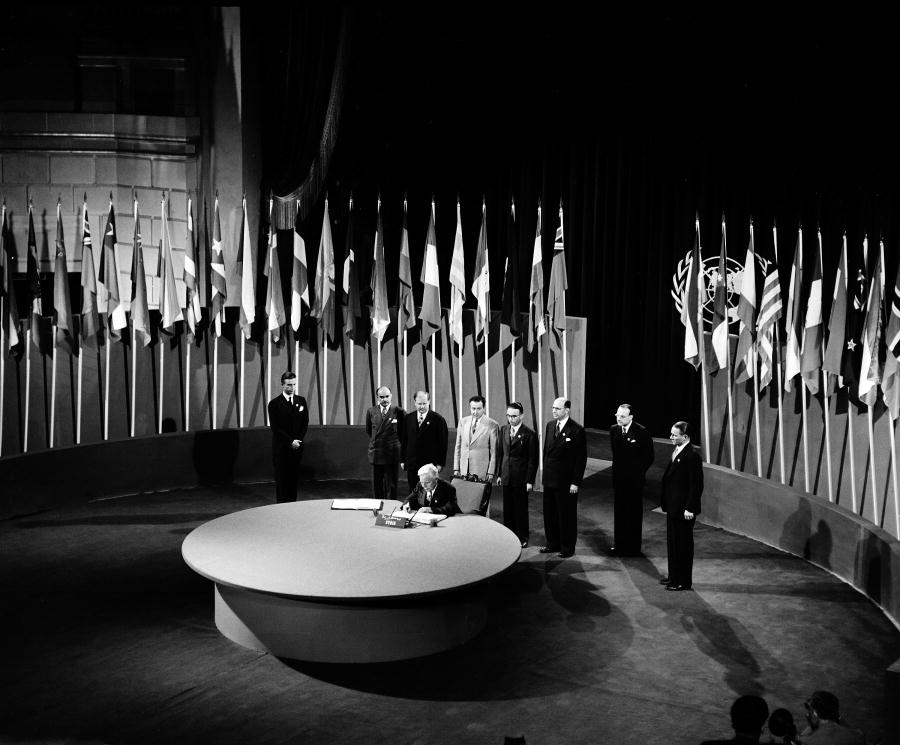
Together, the 50 nations that had declared war on Germany and Japan in WW II, representing more than 80% of the world’s population—people of every race, religion, and continent—all determined to set up an organization that would preserve peace and help build a better world.
Including delegates, staff, and advisers, 3,500 in all, and more than 2,500 press people and observers attended what was called the San Francisco Conference—one of the most important events in history and, to date, the largest international gathering ever held.
The delegates debated what would be in the founding document, and got through their monumental work in exactly two months, adopting it in their last meeting at the city’s Opera House. Lord Halifax presided, and presented the final draft of the Charter, saying, “This issue upon which we are about to vote is as important as any we shall ever vote in our lifetime.”
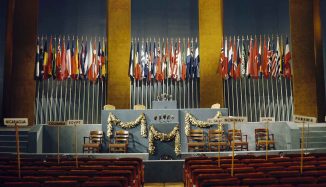 Voting delegations sat below signs for each of 50 nations – United Nations Photo
Voting delegations sat below signs for each of 50 nations – United Nations PhotoIn view of the occasion’s significance, he suggested an alternative to voting by a show of hands, and so every delegate rose and remained standing. So did everyone present, the staffs, the press, and some 3000 visitors, and the hall resounded to a mighty ovation as the Chairman announced that the Charter had been passed unanimously.
Addressing the final session, President Truman said, “The Charter of the United Nations which you have just signed, is a solid structure upon which we can build a better world. History will honor you for it… You have won a victory against war itself… With this Charter, the world can begin to look forward to the time when all worthy human beings may be permitted to live decently as free people.”
It was signed on June 26, the following day. (Photo above shows the Chairman of the Delegation from Syria, signing the UN Charter – United Nations Photo) But, because the Charter had to be approved by congresses or parliaments, four months later, the mission was accomplished and the United Nations came into existence.
“WE THE PEOPLES OF THE UNITED NATIONS DETERMINED
* to save succeeding generations from the scourge of war, which twice in our lifetime has brought untold sorrow to mankind, and (read more)
* to reaffirm faith in fundamental human rights, in the dignity and worth of the human person, in the equal rights of men and women and of nations large and small,
* to establish conditions under which justice and respect for the obligations arising from treaties and other sources of international law can be maintained,
* to promote social progress and better standards of life in larger freedom,
* to practice tolerance and live together in peace with one another as good neighbors,
* to unite our strength to maintain international peace and security,
* to ensure, by the acceptance of principles and the institution of methods, that armed force shall not be used, save in the common interest,
* to employ international machinery for the promotion of the economic and social advancement of all peoples, HAVE RESOLVED TO COMBINE OUR EFFORTS TO ACCOMPLISH THESE AIMS.”
MORE Good News from this Day:
248 years ago today, the national poet of Thailand, Sunthorn Phu was born in Bangkok. A composer of epic poetry, Phu’s life was strange in that it was characterized by constantly entering into and falling out of favor with the royal family. For example, he began the massive epic poem, Phra Aphai Mani during his second stint in prison after a drunken street brawl. After he began releasing this poem, King Rama III liked it so much he made the bard a noble, but subsequently stripped him of this position after he corrected one of King Rama’s poems.
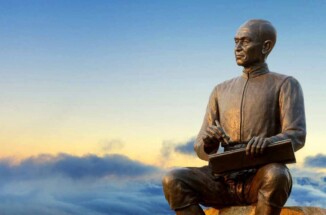 The statue of Sunthonwohan (Phu) at Klaeng District, Rayong Province, Thailand
The statue of Sunthonwohan (Phu) at Klaeng District, Rayong Province, ThailandSunthorn left behind a legacy of poems that have become famous over time because of their description of Thai history. In 1986, the 200th anniversary of his birth, Sunthorn Phu was honored by UNESCO as a great world poet. His Phra Aphai Mani poems, which he released in installments over a 20-year period, describe a fantastical world, where people of all races and religions live and interact together in harmony.
Recently, his literary works have been adapted into various media such as comics, films, and songs. Thai cinema’s first and only cel-animated cartoon feature film, The Adventure of Sudsakorn (1979), was based on a character from Phra Aphai Mani.
The main character enjoys the command of a magical flute, and one of the few verses published freely in English on the internet references this value that the poet placed upon music. (1784)
The worth of music, it includes all things
Of untold value, like a priceless gem.
Humans, garudas, heavenly beings,
Four-legged beasts that roam the jungle wild,
Upon hearing the music from my pipe,
All lose their rage and wildness.
Calm they become, and sleep unknowingly.
An art of such great merit music is.
27 years ago today, the first installment of the Harry Potter book series – Harry Potter and the Philosopher’s Stone, was published in the UK under Bloomsbury. It won most of the British book awards that were judged by children. The book reached the top of the New York Times list of best-selling fiction in August 1999 and stayed near the top of that list for much of 1999 and 2000. It has been translated into at least 73 other languages, and sold 120 million copies, making it the third best-selling book of all time.
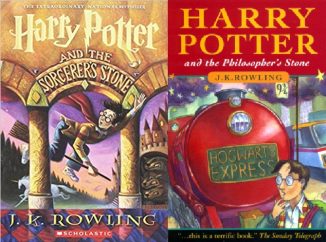 Left, U.S. release cover, right original UK release
Left, U.S. release cover, right original UK releaseCritical acclaim was very positive, with an early review from The Herald saying “I have yet to find a child who can put it down,” and The Scotsman proclaiming it had “all the makings of a classic.”
It has been analyzed, critiqued, re-analyzed, re-examined, and re-imagined, in every conceivable way; torn apart like a man eating a thick-skinned grapefruit with his hands.
To mention just one comment, the great Stephen King admired “the sort of playful details of which only British fantasists seem capable,” noting that they work so well because Rowling enjoys a “quick giggle and then moves briskly forward.” (1997)
Happy 68th Birthday to California-born Chris Isaak whose top 10 song Wicked Game might be the most influential love song in modern music.
Known for his signature 1950s look, falsetto crooning, and reverb-laden music, the guitarist’s sultry music became film director David Lynch’s favorite, featured in numerous films, including Twin Peaks: Fire Walk With Me, in which Isaak was given an acting role
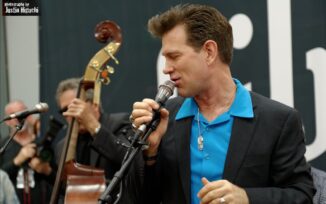 Justin Higuchi, CC license
Justin Higuchi, CC licenseWith 12 studio albums and songs including Somebody’s Crying, he’s been called the Roy Orbison of the 90s and is often also compared to Elvis Presley, Ricky Nelson, and Duane Eddy.
From 2001-2004, Isaak starred in his own television show, The Chris Isaak Show. The Showtime sitcom featured Isaak and his band playing themselves, and the episode plots were based on fictional accounts of the backstage world of Isaak—the rock star next door. His appearances in films include Little Buddha, Married to the Mob, The Silence of the Lambs, That Thing You Do!, A Dirty Shame, and The Informers. WATCH him at 62 still crooning Wicked Game… (1956)
 And, on this day in 1959, the 370-mile-long St. Lawrence Seaway was officially opened, marking the completion of one of the greatest engineering feats of the 20th Century. After 50 years of talks between the U.S. and Canada, the system of locks and channels took five years to construct, spanning the difference of 224 feet in sea level rise to help oceangoing ships move cargo between the Atlantic Ocean and the Great Lakes—the heart of American manufacturing.
And, on this day in 1959, the 370-mile-long St. Lawrence Seaway was officially opened, marking the completion of one of the greatest engineering feats of the 20th Century. After 50 years of talks between the U.S. and Canada, the system of locks and channels took five years to construct, spanning the difference of 224 feet in sea level rise to help oceangoing ships move cargo between the Atlantic Ocean and the Great Lakes—the heart of American manufacturing.
Queen Elizabeth, representing Canada, opened the Seaway with US President Dwight Eisenhower aboard her Royal Yacht Britannia in Montreal. As crowds cheered and waved flags, church bells and fireworks rang out, and all the sirens and horns in the harbor wailed. The two heads of state were each presented with a commemorative book with the names of the 22,000 workers who built the Seaway—“the great joint enterprise between our two countries”.
The 2,300-mile inland water route to Duluth, Minnesota crosses the international border 27 times with the crucial St. Lawrence Seaway (from Port Colborne, Ontario to Montreal) costing $470 million dollars to build. WATCH a 40-second newsreel from the event…
Also, on this day in 1963, John F. Kennedy pronounced the now-famous line, ”Ich bin ein Berliner” (I am a Berliner) during a speech in West Berlin.
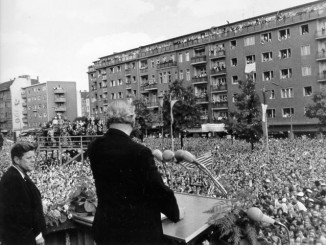
With the remark, Kennedy declared support for the “besieged city” of West Germany 22 months after Soviet-supported East Germany erected the Berlin Wall to prevent any exodus to the West. The message was aimed as much at the Soviets as it was toward Berliners, whose families were separated, and was a clear statement of U.S. policy in the wake of the Communists’ construction of the Cold War Wall. Considered one of Kennedy’s best speeches, it was a great morale boost for West Berliners who lived in an enclave deep inside East Germany and feared a possible communist occupation. Spoken before an audience of 450,000, Kennedy said, “Two thousand years ago, the proudest boast was civis romanus sum [“I am a Roman citizen”]. Today, in the world of freedom, the proudest boast is “Ich bin ein Berliner!”… All free men, wherever they may live, are citizens of Berlin, and therefore, as a free man, I take pride in the words “Ich bin ein Berliner!” WATCH the short speech, below…
NOTE: There’s a widespread misconception that the phrase was used incorrectly and actually means “I am a doughnut”, which has been debunked alongside the equally incorrect statements about the audience laughing at Kennedy’s use of the expression.
SHARE the Milestones, Memories, and Music…
Source link

